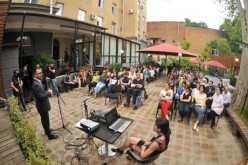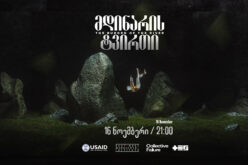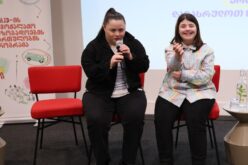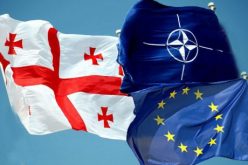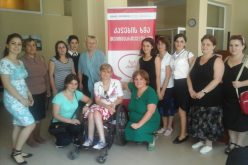The spread of disinformation is a continuing threat to democracies. EWMI ACCESS has supported projects fighting disinformation since 2016. This is how.
While the coronavirus is spreading across the globe, so are disinformation and misinformation. And in Georgia, it’s no different. As the International Society for Fair Elections (ISFED) reports, pro-Kremlin media outlets have been, fruitlessly, trying to pin the outbreak of the virus on Georgia’s US-funded research facility the Lugar Lab, which has been instrumental in testing and successfully containing the virus. The Georgian Orthodox Church has been heavily defending the use of a single spoon during communion, as the holy ritual would cleanse its worshippers; those who oppose it on public health grounds, have been called liberal-fascists by News Front, a pro-Kremlin disinformation outlet.
The magnitude of COVID-19 disinformation is staggering, but disinformation campaigns being pushed through digital channels aren’t new. From fake accounts attacking opposition party members, to spreading conspiracies about the origin of COVID-19, to juxtaposing the image of a weak Europe with that of an invincible Russia.
“People genuinely thought in 2015 that the EU would impose gay marriage on Georgia with the signing of the EU association agreement,” says Nodar Tangiashvili, EWMI ACCESS’ Public Policy and Accountability Adviser. “We had to bring facts back into the conversation and change the narratives.”
That was four years ago, when EWMI ACCESS supported its first countering-disinformation projects after understanding the magnitude and intensity of disinformation. One of its initial aims was to ensure that the Georgian government understood the extent of the issue and prioritized it. By April 2017, the Government made countering anti-western propaganda a vital part of their newly adopted EU and NATO Membership Communication Strategy.
But countering disinformation is extremely complex — partially because it is so widespread, it can’t be tackled with a single approach, it requires a multi-dimensional method. Even though around 70 to 80% of Georgians support EU and NATO membership, the Russian narratives of a western siege against the Georgian identity are consistently believed by about a third to almost half of Georgia’s population.[1]
“We decided to apply a holistic approach, from fact-checking, to crowdsourcing the fight against fake news, to telling people positive and inspiring stories,” Tangiashvili says.
That is why EWMI ACCESS uses a multifold approach. Besides issuing grants to Georgian Civil Society Organizations (CSOs) to monitor, assess, and counter anti-western disinformation, they also organize nationwide information and transparency campaigns to raise awareness about disinformation techniques and its objectives, and help CSOs build their capacity to be able to reach more people with their campaigns.

The Legionnaires, a group of volunteers actively fighting Russian disinformation campaigns on social media. Giorgi Molodini, the Head of StratCom-Georgia — the organization behind the project — explains how their Information Defense Legion, through crowdsourcing, proactively identifies false narratives and produces engaging content to counter it.
“We believe that a state cannot win this war alone. A state and a society are capable of winning such “war” together,” Molodini says about the power of people, and why they chose this approach. The Information Defense Legion, inspired by the Lithuanian Elves, is a popular Georgian-language platform using crowdsourcing and participatory communication in building resilience against anti-western disinformation and fake news in Georgia. Currently, it has 2,000 registered volunteer Legionnaires and its Facebook campaigns regularly reach 100 to 250 K users.
The Information Defense Legion is a prime example of how EWMI ACCESS employs its multiple focus strategy through tracking fake news, informing and engaging citizens, taking over the information flow, and promoting transparency.
But it didn’t start in 2018 with the Information Defense Legion.
Grown into one of the most well-respected sources on disinformation in the South Caucasus region, Myth Detector — a fact-checking portal by the Media Development Foundation (MDF) — was the first organization EWMI ACCESS supported in 2015. The digital portal, currently a verified signature of Poynter’s Institute fact-checker’s global network, quickly responds to, and debunks, false information being shared by politicians and other well-known people.
When EWMI ACCESS understood the scale of disinformation campaigns in Georgia, they realized that most important, initially, was to help CSOs understand which themes to address, what kind of techniques were applied by disinformation campaigns, and how sources used those.
 MDF found that disinformation campaigns mainly tried to pit Georgians against the “morally degrading West that threatens their identity,” and depict NATO, the EU and US as feeble, threatening the country’s security and imposing “LGBT propaganda,” same-sex marriage and pedophilia.
MDF found that disinformation campaigns mainly tried to pit Georgians against the “morally degrading West that threatens their identity,” and depict NATO, the EU and US as feeble, threatening the country’s security and imposing “LGBT propaganda,” same-sex marriage and pedophilia.
Tamar Kintsurashvili, Myth Detector’s Editor-in-Chief, says they started their fact-checking platform when they understood how Russia’s disinformation campaigns had become a legitimate national security threat. “Social media allows anyone direct access to different kinds of sources, it has made it very easy for anyone to misuse it. We wanted to contribute to a more conscious consumption of media by providing facts vs. disinformation,” she says.
As of today, Myth Detector’s work involves more than just fact-checking and media monitoring. After some trial and error, they’ve improved their outreach and launched the Myth Detector Lab, a media literacy program in which they teach adolescents critical thinking and verification skills necessary to identify trolls, and tell quality information from fake news.
Many of the projects EWMI ACCESS supports to counter disinformation operate online as that’s where most Georgians discuss politics and where it’s mostly spread, but not all fights can be won online — especially in Georgia, where many receive their news through television. It’s one of the reasons that EWMI ACCESS decided in 2017 to apply international best practices of integrating fact-checking in the mainstream media. They funded an interactive talk show in which well-known authors discussed anti-western myths, methods of anti-western disinformation and Georgia’s European values on one of the country’s most popular TV stations at the time.
The 20-minute, lively, discussions — part of a popular midday show — were watched by about a third of all TV viewers both in Tbilisi and the regions.
“We also organized live meetings in the regions where people discussed with us [the authors and anchors] the impacts of Russian propaganda,” says Rusudan Vashakidze, the Director of the rubric. She’s especially proud of how ethnic minorities and rural communities — who have a lesser variety of trustworthy sources to access in the country — told her that the show had impacted how they thought about issues.
From organizing book clubs around the country in which people discussed a translated version of Peter Pomerantsev’s famous book “Nothing is True and Everything is Possible: The Surreal Heart of the New Russia”; to supporting campaigns engaging the Teacher of the Year award finalist and winner teachers from across the country to promote critical thinking; to regional meetings, where well-known Georgians and civic activists talked with people — in local community centers, town squares and the backyards of local villagers— about the benefits of Georgia’s European integration efforts for everyone, EWMI ACCESS’ holistic approach tried to cover all aspects of countering disinformation.
EWMI ACCESS’ approach did not only cover mainstream media, but also included high-quality and trustworthy online media, such as Netgazeti and Indigo. These outlets “bombarded” social media with a variety of news, opinion pieces, and videos, which, on the one hand uncovered Russia’s ongoing disinformation tactics and, on the other hand, shared powerful narratives on Georgia’s historic fight against Russification, while stressing the country’s strong architectural, cultural and political bonds with Europe dating back to the late 19th and early 20th century.
To better tailor messages, EWMI ACCESS also decided to experiment with big data research for a target audience analysis, the first of its kind in Georgia. The country’s leading think tank, the Caucasus Research Resource Center (CRRC) – Georgia, created a Russian Propaganda Barometer to track anti-western propaganda on social media by scraping public text data from a large number of anti-western Facebook groups and pages, news media websites, and others. CRRC Georgia also looked into national survey data to identify the key variables and better understand the demographics of those most susceptible to hostile narratives.
“One of the key challenges for us has been to uncover Russian funding and personal links behind the most active anti-western disinformation actors,” says Tangiashvili. “They’re camouflaged really well, that’s why supporting investigative journalism was especially crucial.” The EWMI ACCESS-supported group of independent investigative journalists iFact shed light on the dramatically increased number of Russia-funded CSOs and companies, and scrutinized their links with far-right movements, such as the Georgian March.
In the past four years, EWMI ACCESS has supported 14 projects, from exposing disinformation and debunking fake news to crowdsourcing and educating people, to sharing positive narratives on social media and TV, to door-to-door campaigns in the regions, all with the aim to empower Georgians in understanding and resisting disinformation.
“We’re employing a proactive approach, it’s what works: strategic communications, using emotional and patriotic language on a grassroots level about who we are and what values we have,” says Tangiashvili.
The results don’t lie. Over the past few years, the government has at least rhetorically stood up against anti-western disinformation, while both traditional and online media are covering the topics in multiple news and analyses programs, and more CSOs are working together to uncover and counter anti-western disinformation.
The latest round of grants will meet new challenges, and support, among others, a chrome extension which identifies thousands of trolls, defending the 2020 elections from disinformation campaigns on social media, and projecting positive stories on the democratic history of the country and importance of sovereign elections. It will build Georgia’s resilience and ensure Georgians themselves are better equipped in knowing what’s fake, and what’s not, enabling them to make informed choices.
[1] According to the Caucasus Research Resources Center (CRRC) Georgia, in 2009, only 23% of the public thought that the EU posed a threat to Georgian traditions. In 2019, 42% did.





